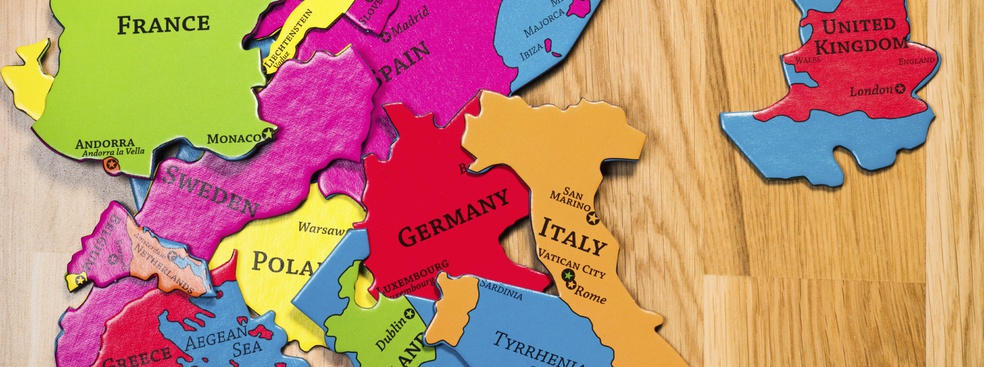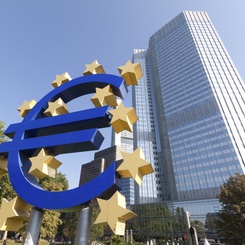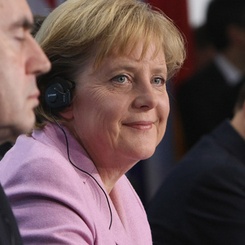On June 23, 2016, 43 years after the United Kingdom became a member of the European Economic Community, the British will decide by referendum if they will exit the European Union (EU). By its size alone, the British economy is one of the most important in Europe: in 2015, its population was 65 million, compared to 443 million for the 27 other EU member countries combined; its GDP of 2569 billion euros represented 17.5% of the EU’s total GDP. With a GDP per capita of 39,500 euros the UK’s is one of the most developed economies in the EU (the average being 28,700 euros). It’s also an open economy, with an exports-to-GDP ratio of 27.6%. UK has been running a trade deficit since 1998; if we focus on its two main trading partners, the UK presents a trade surplus with the United States, and a deficit with Germany.
Numerous studies have attempted to estimate the economic impact a UK exit – or “Brexit” – on the UK economy. However, this exercise is very difficult given the large number of changes it would entail, and the inherent difficulty of modelling large scale economic and social dynamics. For most analysts, the costs of a looser integration between UK and EU markets will likely outweigh any benefits from savings on transfers to the EU budget or increased economic independence, but by a relatively small margin (e.g., Dhingra et al. 2016). In the end, most agree that the British economy should be able to cope with this type of transition. Thus the decision of whether or not to leave the EU appears more than ever as a political one.
However, just because the British should be able to handle a post-Brexit transition without too much difficulty, one shouldn’t assume the EU will be able to handle the transition with the same ease. Clearly, if Brexit raises trade barriers and limits trade with the UK, the impact on EU citizens’ welfare will be minimal. Indeed, Buiter et al. (2016) calculated that in 2010-2014, EU exports (excluding UK) to the UK accounted for only 2.9% of GDP in the region; while imports from UK accounted for their 2.4% of GDP. Some tensions could be recorded at the EU budget level, since the UK currently brings 19% of the total net contribution to the EU budget, but this is a marginal problem given the small size of the EU budget.
The main impact that Brexit would have on the EU is of a different nature. Through years of negotiations and successive treaties, the EU has turned into a vast machine for flattening national institutions, often with a corporatist and interventionist logic.
For example, the “European Working Time Directive" was adopted in 1993, and imposed on the UK in 1998 (with a limited exemption status). It regulates, at European level, maximum work weeks as well as breaks and holidays. Presented by the EU as a major step forward in the protection of individuals from corporate abuses, this directive nevertheless illustrates how the EU hinders the freedom of individuals in deciding what is best for them, and of individual countries in deciding on the preferred labor market institutions. Since its adoption in 1993, successive British governments have positioned themselves against this interference in the management of the labor market, but were unable to alter the position of the European Commission.
The Cassandras who predict the decline of the British financial industry if the country dares to leave the EU have forgotten the European Commission’s plans to regulate banks and tax financial transactions. These plans are the initiative of governments who fail to grasp the fundamental role of the financial industry in the allocation of savings to investment, and who conceal the role of poor regulation in the emergence of financial crises.
Indeed, the UK brings a much needed dose of economic liberalism – a belief in market efficiency and entrepreneurial freedom – to the European Commission. Of course, the UK is not alone in its crusade against interventionism, supported by the Nordic, Baltic and a few Eastern European countries. The departure of the UK would deal a serious blow to this alliance, while strengthening protectionist, centralist supporters within the EU. Such a transformation would carry with it long-term economic risks.
If we follow the reasoning of “Austrian School” economists, the economy is a living organism able to adapt to change by responding to price signals. Just as competition amongst firms forces them to give the best of themselves to satisfy consumers, competition between institutions can test different organizational models and identify those that best meet the needs of citizens. If the EU removes competition between institutions by requiring member countries to follow the same rules on everything, form the same organization, and adopt the same economic principles, then it fails in its mission. A true EU should create the same playing field for all, while allowing countries the freedom to make institutional choices.
If the UK does choose to leave the EU, some will blame the British for their alleged selfishness, lament their anti-Europeanism, and resent their good relations with the United States. We should instead be asking ourselves if we really keep on supporting the EU interventionism, heavy administration, and excessive protectionism – all impediments to competitiveness and growth. If one country chooses economic freedom, others may follow. And move toward another Europe, more dynamic, more modern, and more market-oriented.
References:
Buiter, W., E. Rahbari, C. Schultz, 2016, The implications of Brexit for the rest of the EU, VOX CEPR Portal, March.
Dhingra, S., G. Ottaviano, J. P. Pesoa, T. Sampson and J. Van Reene, 2016, The Consequences of Brexit for UK trade and living standards, CEP Brexit Analysis 2, On-line at: cep.lse.ac.uk/pubs/download/brexit02.pdf.









